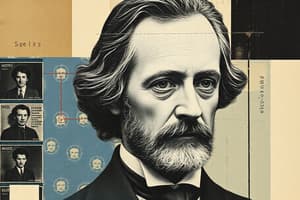Podcast
Questions and Answers
What is a posteriori knowledge?
What is a posteriori knowledge?
- Knowledge that is independent of all experience
- Knowledge derived from sense experience (correct)
- Knowledge that is universally true
- Knowledge acquired through reason
What are a priori ideas also known as?
What are a priori ideas also known as?
Innate ideas
A priori knowledge is derived from sense experience.
A priori knowledge is derived from sense experience.
False (B)
What does 'Cogito, ergo sum' mean?
What does 'Cogito, ergo sum' mean?
What is the coherence theory of truth?
What is the coherence theory of truth?
What does dualism refer to in philosophy?
What does dualism refer to in philosophy?
What is materialism?
What is materialism?
What is methodic doubt?
What is methodic doubt?
What is monism?
What is monism?
What is the ontological argument?
What is the ontological argument?
What does pluralism assert?
What does pluralism assert?
What is rationalism?
What is rationalism?
Flashcards
A Posteriori Knowledge
A Posteriori Knowledge
Knowledge gained from sensory experience.
A Priori Ideas
A Priori Ideas
Truths known without experience, considered certain.
A Priori Knowledge
A Priori Knowledge
Knowledge based solely on reason.
Cogito, Ergo Sum
Cogito, Ergo Sum
Signup and view all the flashcards
Coherence Theory of Truth
Coherence Theory of Truth
Signup and view all the flashcards
Dualism
Dualism
Signup and view all the flashcards
Materialism
Materialism
Signup and view all the flashcards
Methodic Doubt
Methodic Doubt
Signup and view all the flashcards
Monism
Monism
Signup and view all the flashcards
Ontological Argument
Ontological Argument
Signup and view all the flashcards
Pluralism
Pluralism
Signup and view all the flashcards
Rationalism
Rationalism
Signup and view all the flashcards
Study Notes
Key Concepts in Rationalism and Philosophy
-
A Posteriori Knowledge
Empirical knowledge obtained from sensory experience; lacks universality due to variations in perceivers and changing factual relationships. -
A Priori Ideas (Innate Ideas)
Truths independent of observation and experience, considered certain and universally true, serving as a foundation for deduction. -
A Priori Knowledge
Knowledge gained solely through reason, without reliance on sensory experience; exemplified by assertions such as "All triangles have 180°" and "Every event has a cause." -
Cogito, Ergo Sum
Latin expression meaning "I think, therefore I am," symbolizing the foundation of self-awareness and existence in rationalist thought. -
Coherence Theory of Truth
A method of determining truth based on logical consistency and the relation of new ideas to established ones, facilitating a rational evaluation of concepts. -
Dualism
A philosophical viewpoint that asserts the division of existence into two distinct substances, often contrasting mind and body. -
Materialism
The doctrine that all existence is reducible to physical matter and energy; perceives all human behavior as mechanistic, equating thinking to physical processes. -
Methodic Doubt
Descartes' technique of systematically doubting all beliefs to uncover irrefutable truths, aiming for foundational certainty in knowledge. -
Monism
Philosophical position stating that all entities consist of a single, ultimate substance, whether material or spiritual. -
Ontological Argument
A philosophical argument attempting to prove God's existence by analyzing the concept of God or a specific quality attributed to the divine. -
Pluralism
The belief in the existence of multiple realities or substances, countering the simplifications of monism. -
Rationalism
An epistemological stance prioritizing reason as the main source of knowledge, asserting its superiority over sensory evidence and its role in discerning reality from illusion.
Studying That Suits You
Use AI to generate personalized quizzes and flashcards to suit your learning preferences.




